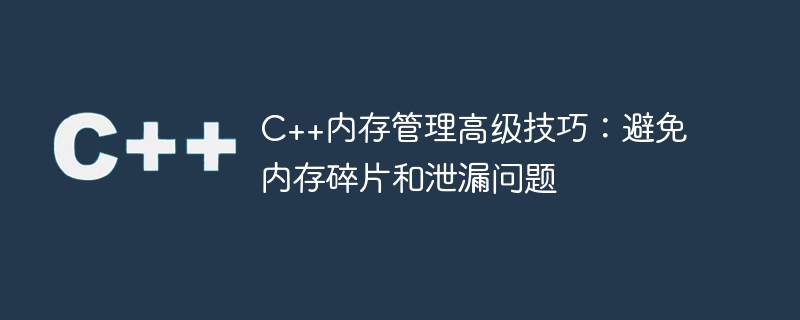

In C programming, memory management is a key skill. Properly managing memory can improve program performance and stability. However, if not handled with care, memory fragmentation and memory leak issues can have serious consequences for your program. This article will introduce some advanced C memory management techniques to help developers avoid these problems.
Memory fragmentation refers to unused small blocks of memory scattered in the heap memory. When memory is allocated and released frequently, a large number of memory fragments will be generated, resulting in memory discontinuity and waste. A memory leak means that the applied memory is not released in time, causing the program to occupy more and more memory. Both problems can lead to inefficient memory usage and even cause program crashes.
A common way to solve the problem of memory fragmentation is to use a memory pool. A memory pool is a pre-allocated memory area used to store multiple objects. By maintaining a free linked list, memory can be managed efficiently and the generation of memory fragmentation can be reduced. When an object needs to be allocated, a block of memory is taken from the free linked list for allocation; when the object is no longer used, the memory block is re-added to the free linked list for the next allocation. The memory pool can reduce the generation of memory fragmentation and improve the efficiency of memory allocation.
Another tip to avoid memory fragmentation is to use memory alignment. Memory alignment refers to setting the first address of a data structure to a multiple of a specific value. In some architectures, accesses can only be made in specific multiples, which can cause performance degradation or errors if unaligned memory is accessed. By properly setting memory alignment, you can reduce the occurrence of memory fragmentation and improve memory access efficiency. You can use C's alignas keyword or the preprocessor's alignof and align attributes to align variables in memory.
For memory leak problems, an effective method is to use smart pointers. Smart pointers are a special pointer class template provided by the C standard library that can automatically release the occupied memory when the object is no longer referenced. Unlike raw pointers, smart pointers do not need to explicitly call delete to release memory, thus avoiding the problem of forgetting to release memory. Common types of smart pointers are unique_ptr, shared_ptr and weak_ptr. Using smart pointers can avoid memory leak problems and improve code reliability.
In addition to using smart pointers, you can also use RAII (resource acquisition i.e. initialization) technology to avoid memory leaks. RAII is a C programming idea. Based on the consistent life cycle and scope characteristics of stack objects, it ensures the correct management of resources by acquiring resources in the object's constructor and releasing them in the destructor. By using RAII, you can avoid the hassle of manually managing memory and improve the readability and maintainability of your code.
In addition, using smart pointers and RAII technology can also reduce exceptions in the code. When an exception occurs in the program, if the release of memory is not handled properly, memory leaks may occur. The use of smart pointers and RAII technology, due to its automatic release of resources, can automatically perform the release operation when the object is destructed, ensuring that memory will not leak.
In short, memory management is an essential part of C programming. To avoid memory fragmentation and memory leak issues, developers can use advanced techniques such as memory pools, memory alignment, smart pointers, and RAII technology. By properly managing memory, program performance and stability can be improved. However, it is worth noting that these tips only help developers reduce the occurrence of memory problems, but cannot completely eliminate them. Therefore, when writing C programs, memory management issues still need to be handled with care and caution.
The above is the detailed content of Advanced C++ memory management tips: avoid memory fragmentation and leak problems. For more information, please follow other related articles on the PHP Chinese website!
 What are the anti-virus software?
What are the anti-virus software?
 Domestic digital currency platform
Domestic digital currency platform
 How to configure Tomcat environment variables
How to configure Tomcat environment variables
 What does c# mean?
What does c# mean?
 How to recover permanently deleted files on computer
How to recover permanently deleted files on computer
 How to open html files on mobile phone
How to open html files on mobile phone
 Oracle database recovery method
Oracle database recovery method
 How to solve problems when parsing packages
How to solve problems when parsing packages




